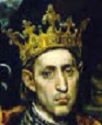
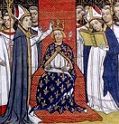

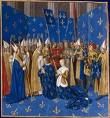


1270 By this time the German monarchs have been totally eliminated as a factor in Euro politics by the Capetian French monarchs, who have the wealthiest state in Europe, a stronghold in Sicily, a French party in the college of cardinals, and an adoring papacy. On May 3 Bela IV (b. 1206) dies (along with rival Stephen d'Este?), and his son (by wife Salome) Stephen V (1239-72) becomes a weak king of Hungary (until 1272); meanwhile Stephen has son Andrew III (d. 1301) by wife Tomasina Morosini, who waits in the wings (until 1290)? Margaret II of Flanders confiscates the property of English merchants, causing a devastating trade war with England, which supplies most of the wool for Flemish weavers. After Albertus Magnus successfully preaches a crusade in Austria, and at the insistence of Charles of Anjou, whom he made king of Sicily in 1265 and who has big Mediterranean ambitions, French king (since 1226) (St.) Louis IX (b. 1214) leads the Eighth Crusade (his 2nd), makes an ill-advised expedition to Tunis, and dies on Aug. 25 in Damietta of dysentery along with his son John Tristan; his army returns to France with his body, which is buried in Saint-Denis; he is succeeded by his pious but uneducated and bold (rash in judgment) son Philip III (the Bold) (the Strong) (1245-85) as Capetian king #10 (until 1285); Charles of Anjou takes over the Crusade, which fizzles; being uneducated but pious, Philip III ends up being dominated at various times by his mother Margaret of Provence (1221-95), his favorite valet Pierre de la Broce (Brosse) (-1278), his wife Mary of Brabant (1250-1321), and his uncle Charles I of Naples. On Aug. 10 Yekuno (Yikunno) Amlak (Tasfa Iyasus) (1270-85) deposes the last Zagwe king and becomes king of Ethiopia (until June 18, 1285), founding the modern Christian Solomonic Dynasty, claiming descent from King Solomon and the Queen of Sheba, and continuing the old Kingdom of Axum; he petitions the Egyptian sultan for a metropolitan for the Ethiopian Orthodox Church, but is snubbed, causing him to invite priests from Syria. Mamluk Sultan Baybars destroys the ancient city of Ashkelon (Ascalon) on the Mediterranean coast of Palestine; in the 16th cent. the Ottomans establish the Arab village of aj-Majdal a few km. inland. On Dec. 4 Theobald V (b. 1238) dies without an heir in Sicily while returning from the Eighth Crusade, and his younger brother Henry the Fat (1244-74) becomes count Henry III of Champagne and Brie, and king Henry I of Navarre (until 1274). Hetoum I the no-longer-great, rocked by his losses to the Mamluks abdicates and enters a monastery, and his son Levon (Leon) (Leo) II (1236-89) becomes king of Christian Lesser Armenia (Cilicia) (until 1289), continuing to keep the pesky Muslim Mamluk invaders out for his dear savior Christ. The War of St. Sabas (begun 1256) finally ends after 20K are killed on both sides, fatally weakening the Crusader states; even then, the Venetians don't give the Genoese their quarter of Acre back until 1288. The city of Rotterdam in S Holland on the Rhine-Meuse-Scheldt River Delta on the North Sea (modern-day pop. 635K/1.1M) is founded after a dam is built on the Rotte River; in 1340 it is granted city rights by the count of Holland; it goes on to become the 2nd largest city in the Netherlands after Amsterdam, home of Erasmus U. (1913). By this year there are univs. throughout Europe, incl. Cambridge, Oxford, Paris, Orleans, Toulouse, Palencia, Salamanca, Seville, Montpelier, Vicenza, Padua, Reggio, Bologna, Rome, Naples, Arezzo, and Salerno; later more univs. are founded in Coimbra, Lisbon, Valladolid, Huesca, Cerida, Cahors, Perpignan, Avignon, Grenoble, Angers, Vercelli, Pisa, Florence, Ferrara, Treviso, Perugia, Heidelberg, Cologne, Erfurt, Prague, Vienna, and Ofen. About this time Roger Bacon of England writes the soundbyte: "The philosophy of Averroes today obtains the unanimous suffrage of wise men." After turning against it for being authored by a pagan Greek, and transmitted to the West via Muslim Spain, Paris bishop Etienne Tempier (Stephanus of Orleans) (-1279) condemns Aristotelianism this year, and again in 1277, ending educational freedom in Paris; the part he most objected to was the idea that man shouldn't be content with authority alone as a means of acquiring certainty, but should believe nothing that isn't known in itself or can't be explained by known principles; ironically, Dominican big brain St. Thomas Aquinas brings Aristotle back as the official doctrine of the Roman Catholic Church. A law is passed in Paris outlawing people from throwing "waters" or "ordures" from upper story windows or face a fine - I am an island? Architecture: The Gothic Altneu (Old New) Synagogue in Prague is built. The Damascus Hospital is built, also housing mental patients. Kosice is named a royal free town by Stephen V, and the Gothic St. Elisabeth Cathedral is begun (finished 1468). The choir and cloisters of Westminster Abbey (begun 1245) are finished. Hever Castle 30 mi. S of London near Edenbridge, Kent is built, later becoming the childhood home of Anne Boleyn, and acquired in 1903 by William Waldorf Astor (1848-1919), who pumps it up and creates Tudor Village. Nonfiction: Thomas Aquinas (1225-74), On the Unity of the Intellect Against the Averroists; turns the tide against Siger de Brabant and the Averroists, causing the Church to back him and condemn them. Marcus Graecus (Mark the Greek), Liber Ignium ad Comburendos Hostes (Book of Fires for Burning Enemies); describes Greek fire and phosphorescence, and gives a recipe for gunpowder as 1 lb. of live sulfur, 2 lbs. of charcoal from a lime or willow tree, and 6 lbs. of saltpeter. Raymundus Martini, Pugeo Fidei; Spanish monk first uses the word "Jehovah". Peter of St. Omer, Liber de Colorius Faciendis; contains recipes for painting pigments, incl. the use of linseed oil for oil painting. Witelo (1230-1313), Perspectiva; work on optics based on Alhazen, containing speculations on psychology, nearly discovering the subconscious. Births: French Capetian king of Aragon (1284-1325), count of Valois (1284-1325), and count of Anjou and Maine (1290-1325) (founder of the House of Valois) Charles of Valois (d. 1325) on Mar. 12; 3rd son of Philip III (1245-85) and Isabella of Aragon (1247-71); brother of Philip IV the Fair (1268-1314); father of Philip VI (1293-1350); uncle of Louis X, Philip V, and Charles IV. Scottish conservative Franciscan scholastic philosopher-theologian ("Doctor Subtilis") (Lat. "cunning linguist, er, teacher") John (Johannes) Duns Scotus (d. 1308) (b. 1265/6?) in Duns, Berwick County, Scotland; teaches in Paris, Cologne, and Oxford, gaining a rep for his dialectic skill in defending the doctrine of the Immaculate Conception, causing the Roman Catholic Church to adopt it; his followers are called Dunsmen, Dunses or Duncemen, and as they come to resist the revival of classicism and progressive forms of learning, esp. Renaissance humanism, and "rage in every pulpit" in an obstructionist fashion, the term "dunce" is coined - the original Mel Gibson, or his daddy? Scottish noble John III "Black" Comyn, Lord of Badenoch (d. 1306). Norwegian king (1299-1319) Haakon V Magnusson (d. 1319); son of Magnus VI the Lawmender (1238-80) and Ingeborg of Denmark (1244-87). Greek scholar-statesman Theodore Metochites (d. 1332) in Constantinople. Italian poet-jurist Cino da Pistoia (Guittoncino dei Sinibaldi) (d. 1337) in Pistoia; educated at the U. of Bologna; friend of Giovanni d'Andrea, Dante Alighieri (1265-1321), and Petrarch; dedicates his 200-odd lyric poems to his babe Selvaggia. Italin Franciscan theologian Michael of Cesena (Michele Fuschi) (d. 1342) in Cesena. French rector (U. of Paris) and political theorist Marsilius (Marsiglio) of Padua (d. 1342); champion of the Conciliar Movement for popular sovereignty in Europe. Italian canon law jurist Giovanni d'Andrea (Johannes Andreae) (d. 1348) in Mugello (near Florence); friend of Cino da Pistoia. Deaths: Spanish rabbi-physician Nachamanides (b. 1194) in Palestine. German poet-minnesinger Tannhauser (b. 1205). Hungarian-Croatian king (1235-70) Bela IV (b. 1206) on May 3. French king (1226-70) St. Louis IX (b. 1214) on Aug. 25 in Tunis (Damietta, Egypt?) (dysentery); last word: "Jerusalem"; canonized by Pope Boniface VIII in 1297; his holy mojo causes future French kings to line up in the Louie, Louie line. French count of Champagne (1253-70) Theobald V (b. 1238) on Dec. 4 in Trapani, Sicily. Sicilian-German princess Margaret of Sicily (b. 1241) on Aug. 8 in Frankfurt-am-Main.




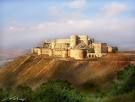
1271 I'm just the muscle you muscleheads need? On Apr. 8 the impregnable Crusader stronghold Krak des Chevaliers (Crag of the Knights) in the Syrian desert 25 mi. W of Homs, guarding the road from Damascus to Tripoli and Jerusalem, "the most wholly admirable castle in the world" (Lawrence of Arabia), which had withstood 12 Saracen attempts finally falls after Mamluk Sultan Al-Zahir Baybars, leading an Egyptian army tricks the skeleton crew of monkish defenders by sending a carrier pigeon with a forged letter purportedly from the Grandmaster of the Hospitalers in Tripoli ordering them to surrender; Baybars gives the garrison free conduct to Tripoli amid his loud laughs; after hearing of this, Prince Edward I Longshanks (1239-1307) leads the (last) Ninth Crusade (ends 1272), taking his wife Eleanor of Castile along and winning Vs at Acre and Haifa, then trying to figure out how to take back their impregnable fortress without the carrier pigeon trick - the idea of a security backdoor is born too late? On Aug. 21 Count Alphonse of Toulouse and Poitiers (Poitou) (b. 1220), uncle of Philip III the Bold dies, bringing Languedoc under royal sway, and establishing the royal power in S France, incl. Carcassone and Aigues Mortes, giving access to the Mediterranean; new walls are ordered to be built. On Sept. 1 Teobaldo Visconti, archbishop of Liege is elected Pope (#183) Gregory X (1210-76); he is later beatified (no sainted popes since Gregory VII two cents. earlier). Kublai Khan officially proclaims the Great Yuan (Mongol) Dynasty (ends 1368); meanwhile the Polos begin their 2nd trip from Europe to Asia (ends 1275), accompanied by Niccolo Polo's 17-y.-o. son Marco Polo (the Younger) (1254-1324), stopping in Jerusalem to get oil from the lamp of the Holy Sepulchre as requested by Kublai Khan, sailing to the SE Turkish port of Ayas, then traveling E by caravan across the entire width of Asia through E Turkey (noting that Mt. Ararat is too hard to climb), Georgia and Azerbaijan (noting "a fountain from which oil springs in great abundance", which is good for burning but no good in a salad), Armenia (with 30 lb.-fat-tailed sheep), Persia (noting the cool soft Kerman "shals"), Badakhshan (seeing salt mined and rubies dug), then via camel along the S Silk Road through the Taklamakan Desert and Great Sand Sea (Gobi Desert) (noting sandstorms and mirages), visiting Balkh, the Pamir Plateau, Kashgar, Khotan, Lop Nor, Tangut, and Kanchow, homeland of the Mongols, finally reaching Chandu (Shangtu) (Xanadu), becoming the first Westerners in a generation to cross the Wakhan Corridor to China; during his visit to Baku, Azerbaijan on the shores of the Caspian Sea, he sees oil being collected from seeps, writing the soundbyte: "On the confines toward Georgine there is a fountain from which oil springs in great abundance, in as much as a hundred shiploads might be taken from it at one time. This oil is not good to use with food, but 'tis good to burn, and is also used to anoine camels that have the mange. People come from vast distances to fetch it, for in all the countries round there is no other oil." End of the Rus Rurik Dynasty (begun 862). Burma rejects Mongol demands for tribute. The Sorbonne adds the College de Calvi (Little Sorbonne) to give preliminary prep. in the humanities and philosophy. Inventions: Robert of England first correctly states the theory of the Pendulum Clock; a big one is built in a tower in Westminster in 1288, spreading to the Continent. Nonfiction: Roger Bacon (1214-94), Compendium Studii Philosophiae; unfinished ms. dissing nominalism in favor of realism; "A universal is nothing but the similarity of several individuals"; "One individual has more reality than all universals put together"; too bad, he also goes after the clergy, papacy, univs., and philosophers of his day, listing "36 great and radical defects", even going after Thomas Aquinas for pontificating on the angels, causing a conspiracy to silence him? Births: French queen (1285-1305) Jeanne (Joan) (Johanna) I of Navarre (d. 1305) on Jan. 14 in Bar-sur-Seine; daughter of Henri I the Fat of Navarre (1244-74) and Blanche of Artois (1248-1302); wife (1284-1305) of Philip IV (1268-1314); mother of Louis X (1289-1316), Philip V (1292-1322), Charles IV (1294-1328), and Isabelle of France (1295-1358). Bohemian king (1278-1305) and Polish king (1300-5) Wenceslaus (Wenceslas) II Premyslid (d. 1305) on Sept. 27; only son of Premysl Ottokar II (1230-78) and 2nd wife Kunigunda; father of Wenceslaus III (1289-1306). Deaths: Armenian historian Kirakos Gandzaketsi (b. 1200) in New Getik. Persian mystic Muslim humanist Haji Bektash Wali (b. 1200) in Anatolia. French duke of Burgundy (1218-71) Hugh IV (b. 1213) on Oct. 27.


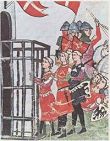
1272 In June sultan (since Oct. 1260) Baibars of the Bahri Dynasty is so worried by the arrival of Edward I Longshanks at Acre that he makes an assassination attempt on him, getting him wounded in the arm with a poisoned dagger, which becomes so inflamed that his surgeon has to cut away the diseased flesh, causing his babe Queen Eleanor to be led from his bed "weeping and wailing; after concluding a 10-year truce with the Muslims, they leave Palestine in Sept., and reach Sicily in Dec., learning of Henry III's death. On July 19 Gouda in SW Holland (NE of Rotterdam) receives a charter, and begins making clay pipes. On Aug. 6 Stephen V (b. 1239) dies suddenly while trying to raise an army to rescue his kidnapped son (by wife Elizabeth of Kumania) Ladislas (Ladislav) (László) (Laszlo) IV (the Cuman) (1262-90), who becomes Arpad king of Hungary, who doesn't accede to the throne, then tries unsuccessfully to curb the power of the feudal aristocrats, his poor education not helping. On Oct. 27 Hugh IV (b. 1213) dies, and his 3rd son (with 1st wife Yolande de Dreux) Robert II (1248-1306) becomes duke of Burgundy (until 1306). Time won't let me wait that long? On Nov. 16 king (since Oct. 19, 1216) Henry III (b. 1207) dies after a 56-year reign, and his tall (6'2") (6'7"?), handsome (with a drooping left eyelid like his daddy), quick-tempered 33-y.-o. son (makes a dashing figure on his horse?) Edward I (Longshanks) (1239-1307) becomes king of England (the 29th English monarch) (until July 7, 1307) (everybody called him Longshanks, but never to his face?), the English Justinian, the first truly English king, an able ruler and great legislator surrounded by able ministers and lawyers and frequently consulting the knights and townsmen; his motto is "pactum serva" (keep troth); returning from the Crusades, he spends a year in Gascony (Basque-ony, old land of the car-door-ear Basques in SW France on the Bay of Biscay), and is not crowned until 1274; the permanent loss of Jerusalem ends the fantasy of it being the capital of Christendom, further solidifying European unity that was helped in 1453 by the loss of Constantinople. Sardinian king (since 1238) Enzo (b. 1218), illegitimate son of HRE Frederick II dies in Bologna (a prisoner since 1249), and along with him the Hohenstaufen line. Robert, 6th son of Louis IX of France marries Beatrix, descendant of Aimar (Adhemar), 9th cent. founder of the Bourbon family in France, based in Bourbon castle in the ancient Roman town of Aquae Borvonis; this marriage is used by their descendant Henry of Navarre in the 16th cent. to claim the French throne, after another line through them ends with Charles de Montpensier, duc de Bourbon. Thomas Aquinas leaves Paris for Naples to organize a new Dominican school. Scottish knight Robert Bruce, 6th Lord of Annandale (1243-1304) marries Marjorie Carrick, heiress of Earl Neil of Carrick, becoming the 2nd earl of Carrick and going on to have 11 children, incl. King Robert I the Bruce (b. 1274); too bad, he doesn't have royal consent to marry, causing her to temporarily lose her castle and estates until she pays a fine. Sultan Baibars allows the Franciscans to settle in the Cenacle (Upper Room) on Mount Zion in Jerusalem; in 1309 they are allowed to settle in the Holy Sepulchre in Jerusalem, and Bethlehem; in 1333 king Robert d'Angio of Naples and his wife Sancia di Maiorca buy the Cenacle from the Egyptian sultan and donate it to the Franciscans. Pope Gregory X repeats Pope Innocent IV's 1247 denunciation of the legend of ritual murder of Christian children by Jews, requiring from now on that the testimony of a Christian against a Jew be backed up by another Jew; Jews are protected from persecution in the Papal States. The Fishmongers' Co. is founded in London, England, complete with the Leyhalmode, a court of law to settle disputes over the seafood trade (until 1399). Inventions: A silk-reeling machine is invented by ?. Nonfiction: The earliest known document in Yiddish is a blessing in the Worms Mahzor, a Hebrew prayer book. Anon., History of Vietnam (30 vols.) (1272-1697); first comprehensive history of Vietnam; pub. in Vietnam. Births: Spanish king of Sicily (1296-1337) Frederick III (d. 1337) on Dec. 13 in Barcelona; 3rd son of Peter III of Aragon (1239-85) and Constantia of Sicily (1249-1302) (daughter of Manfred of Sicily); brother of Alfonso III of Aragon (1265-91) and James II of Aragon (1267-1327). Scottish "fireballs from his eyes and great bolts of lightning from his arse" fighting hero Sir William Wallace (d. 1305) in Jan. in Elerslie (Elderslie) in Paisley Parish, Renfrewshire (10 mi. SW of Glasgow); 2nd son (of 3) of Sir Malcolm Wallace (-1291), vassal of James Stewart, high steward of Scotland; learns Latin and French from his uncle Argile; husband of Marian Braidfoot (-1297). French count of Nevers Louis I (d. 1322); son of Count Robert II of Flanders and Countess Yolande. Deaths: English scholar Bartholomew of England (b. 1202) in Saxonia. English king (1216-72) Henry III (b. 1207) on Nov. 16 in Westminster, London. Italian St. Zita (b. 1212) on Apr. 27 in Lucca; canonized in 1696. French duke of Burgundy (1218-72) Hugh IV (b. 1213) on Oct. 27. Sardinian king (1238-72) Enzo of Sardinia (b. 1218) in Bologna; dies in prison. Japanese Yamato emperor #88 (1242-6) Go-Saga (b. 1220) on Mar. 17. Hungarian king (1270-2) Stephen V (b. 1239) on Aug. 6 in Cespel Island. English duke Richard of Cornwall, king of the Romans. Muslim Granadan ruler Muhammad I (b. ?).

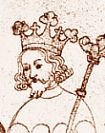

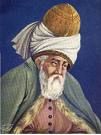
1273 On Jan. 29 Robert Wishart (-1316), of Norman-French descent, a relation of William Wishart, bishop of St. Andrews becomes bishop of Glasgow, Scotland. On Oct. 29 despite up-and-coming Ottokar II (1230-78) of Bohemia seeking the German crown, Count Rudolf of Hapsburg is elected German king Rudolf (Rudolph) I (1218-91) (until 1291), and crowned at Aix-la-Chapelle, officially ending the Hohenstaufen Dynasty (begun 1138), and founding the Hapsburg (Habsburg) (Ger. "Hawk's Castle") Dynasty, which rules Germany and the HRE until 1806, extending its boundaries until the Protestant German states break away in 1648; in Oct. the Great Interregnum (begun 1254) ends as he is crowned HRE Rudolf I by Pope Gregory X in Lausanne, becoming a papal V over the formerly Hohenstaufen German-owned Holy Roman Empire, marginalizing its political and religious power in Europe and making the imperial title little more than honorary, albeit with cool pageantry; nonplussed, Ottokar II refuses to recognize him and contests his election, while Charles of Anjou unsuccessfully vies for the imperial crown; too bad, the Hapsburgs only control S Germany, leaving the rest of Germany to the zillion other petty princes, keeping Germany from uniting under a kick-ass fuhrer, er, emperor until 1870; meanwhile somewhere along the line the males married into the Polish Piast family, Masovian branch, giving them a hereditary deformity called Prognathism (Habsburg Jaw) that gave them hog jaws and lips - like Jay Leno? Edward I summons reps. of both counties and towns to meet with the great council (and again in 1275). The walled cities of Xiangyang and Fancheng in Hubei Province in China are taken by the Mongols after 4.5 years (1269). Thomas Aquinas stops work on "Summa Theologica" and never finishes it; the basis of all Roman Catholic theological teaching is incomplete? Architecture: Regensburg Cathedral begins reconstruction (finished 1534). Births: Spanish king Frederick III of Aragon (d. 1337); son of Peter III of Aragon (1239-85). Ethiopian Orthodox Church leader Ewostatewos (Eustatius) (d. 1352) on July 15 (21 Hamle) in Tsira', E Tigray. Deaths: Sufi Mevlevi Order (Order of the Dancing or Whirling Dervishes) founder Jalal al-Din (Jalaluddin) Rumi (b. 1207) on Dec. 17 in Konya; leaves Mathnawi (Mathnavi) (6 vols.); his son Sultan Baha al-Din Muhammad-i Walad founds the Mevlevi (Mawlawiyya) Order AKA the Whirling (Dancing) Dervishes (Pers. "beggars"); Rumi's ecumenical mystical poetry stays popular to modern times.
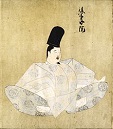



1274 On Feb. 2 a plot by his brother Dafydd to kill Welsh prince Llywelyn the Last is foiled by a snowstorm, after which Dafydd flees to England into the arms of Longshanks. On Mar. 6 emperor (since Jan. 9, 1260) Kameyama (b. 1249) abdicates, and on Mar. 6 his cousin Go-Uda (1266-1324) becomes Japanese Yamato emperor #91 (until 1287); on Nov. 19 the Mongols under Kublai Khan attempt an invasion of Japan, but are repulsed by the samurais; too bad, Hakozaki Shrine in Fukuoka is burned to the ground, and later rebuilt with a sign reading "Surrender of the enemy nation" (Tekikoku kofuku)- try to imagine that scene? In May after Byzantine emperor Michael VIII Palaeologus allies with the papacy against Charles I of Naples and Sicily, the Second Ecumenical Council of Lyons (first 1245) convenes, and the Greek Byzantines recognize the authority of the Roman Catholic pope in return for the council authorizing funds for another Crusade, which is never carried out, causing Michael VIII to be villified after his death, and the attempted reunion of the Roman and Greek churches to fall flat; on July 4 an embassy led by Mongol clerk-translator Rychaldus (Richardus) arrives to deliver a report on behalf of Mongol Christian gen. Abaqa seeking an alliance to drive the Mamluks out of Syria; meanwhile to quiet Byzantine critics and prevent another conclave of Viterbo, Pope Malcolm, er, Gregory X decrees that the cardinals have to be locked up until they elect a pope, founding the Papal Conclave (Lat. "with key"). On July 15 while the Council of Lyons holds its 2nd session, Bonaventura (b. 1221) dies after being made cardinal of Albano. On July 22 "kindly-faced" (Dante) Henry I the Fat of Navarre (b. 1244) dies (from suffocating in his own fat?) without an heir (his only son Theobald fell from a battlement at Estrella Castle in Castle last year), ending the male line of the house of Champagne; his 3-y.-o. Salic-challenged daughter Joanna of Champagne (1271-1305) rules Champagne alone (until 1305), with her mother Blanche of Artois as regent, having to fight off all kinds of threats to the throne of Champagne, and ultimately being driven into the arms of Philip III. On Aug. 19 Edward I is crowned king of England in Westminster Abbey. The Marinids under Abu Yaqub Yusuf siege the oasis of Sijilmasa SE of Fez in W Maghreb (founded 757), using gunfire-powered cannon as siege engines. The Diet of Regensburg deprives Ottokar II of his dominions, after which his enemy HRE Rudolf I places him under the ban of the empire next year. (Comtat) Venaissin (kon-tahv-eh-neh-SAH) in SE France (bounded by Dauphine on the N, Provence on the E and S, and Languedoc on the W) comes under papal rule (until 1791). Duisburg, Germany establishes a town council with two mayors. 9-y-o. Dante Alighieri (b. 1265) meeets fellow Florentine, 8-y.-o. Beatrice Portinari (1266-90), and falls in love at first sight, spending the rest of his life obsessed with her although he never gets past greeting her in the street, and remaining unable to turn his genetic mate-hunting radar off even after she dies in her prime in 1290, turning her into the #1 Dolce Stil Nuovo babe, the object of pure courtly love, his reason for living, his eternal guardian angel, all despite marrying a real crapping farting foul-mouthed aging breed mare and having a big brood of rugrats - why do fools fall in love? Births: French Catholic bishop (St.) Louis of Toulouse (d. 1297) in Feb. in Brignoles, Provence; 2nd son of Charles II the Lame of Anjou (1254-1309) and Maria Arpad of Hungary (1257-1323); brother of Robert the Wise of Anjou (1277-1343); feast day: Aug. 19. Burmese Hanthawaddy king #2 (1307-11) Hkun Law (d. 1311) on Mar. 16 in Donwun; brother of Wareru (1253-1307). English prince of Wales #1 and king (1307-27) Edward II (d. 1327) on Apr. 25 in Caernarfon Castle, Gwynedd; 4th son of Edward I of England (1239-1307) and 1st wife Eleanor of Castile (1241-90). Scottish king (1306-29) Robert I the Bruce (de Brus) (OF "brushwood thicket"), 7th Lord of Annandale and 2nd Earl of Carrick (d. 1329) on July 11 in Turnberry Castle, Ayrshire; son of Robert Bruce, 6th Lord of Annandale and 2nd Earl of Carrick (1243-1304), keeper of Carlisle Castle and Countess Marjorie of Carrick (-1292) (with both Norman and royal Scots blood in his veins, the latter via his mother, who is from an old Scottish Celtic family); grandson of "Old Competitor" Robert Bruce, 5th Lord of Annandale (1220-95), crusading companion of the English royals, who conspires to put him on the throne ahead of John Balliol; brother of Neil Bruce (1276-), Edward Bruce (1279-), Thomas Bruce (1284-) and Alexander Bruce (1285-); receives training in the chivalric and courtly arts in the English royal household, becoming a pro with the battle axe, and learns Latin, English, and Gaelic. Deaths: French Sorbonne founder Robert de Sorbon (b. 1201) on Aug. 15 in Paris. Persian Shiite theologian-astronomer Nasir ad-Din Tusi (b. 1201) on June 26 in Baghdad. Italian Catholic theologian St. Bonaventura (b. 1221) on July 15 in Lyons, France. Italian Roman Catholic #1 theologian St. Thomas Aquinas (b. 1225) on Mar. 7 in Fossanova; dies in the Cistercian monastery while en route to the Council of Lyons; his tomb is built in Toulouse; leaves the hymn Pange Lingua (composed for the Feast of Corpus Christi), and the unfinished Summa Theologica (Theological Compendium) (finished by his editor Reginald of Piperno?), an attempt to use the Aristotelian science and logic of the Averroists to justify the conclusions of St. Augustine and the Neoplatonists, while denying Averroes' double-truth theory that there is one truth in science and another in faith; incl. the Five Arguments for the Existence of God (Quinque Viae), the Prime Mover, who is perfect, omniscient, omnipotent, and free; after his work sinks in, it turns the Roman Catholic Church decisively Aristotelian, widening the split with the Eastern Orthodox Church, which remains Platonist and sinks into mysticism. French king of Navarre (1270-4) Henry I (b. 1244) on July 22.
1275 What was that about the lights of Broadway? Backward West meets Dazzling East and likes it? In May Marco Polo (1254-1324) and his party arrive at Kublai Khan's summer capital of Chandu (Shangtu) (Xanadu) N of the Great Wall in Cathay (China), where they stay until 1292, noting that he keeps 10K milk-white horses within the walls of his summer residence; in the fall they accompany Kublai Khan to his winter capital at Peking, where they view his "stately pleasure dome" of violet, green, and vermilion on gilded walls carved with figures of dragons and Buddhas, which has a huge hall capable of entertaining 6K at dinner; the royal dude has 1M retainers, and his New Year's parade features 5K elephants each carrying two coffers of treasure; Marco pleases Kublai's ear with his own stories, and is given free run of Cathay for 17 years, observing spectacles (eyeglasses) in gen. use. In Sept. after Muhammad II of Granada asks for help from Moroccan sultan Abu Yusuf Yaqub ibn Abd Al-Haqq, the first of four Muslim Marinid invasions from Africa to Spain over 10 years sees troops from the Nasrid Emirate of Granada defeat the Christians of the Kingdom of Castile at the Battle of Ecija. A Scottish force from Galloway is sent to take on Manx king Gofraid Magnusson (bastard son of the previous king Magnus Olafsson, who had seized power), and they bloodily subdue him. Yielding to public outcry over Jewish practices, but not wanting to expel them just yet, Edward I of England issues the Statute of the Jewry, forbidding usury and instituting an experiment in getting Jews to take up new trades such as agriculture and crafts, giving them 15 years to read just before calling it a failure and expelling them in 1290; since 1218 Jews are required to wear a special badge. Edward I begins enacting the Statutes of Merchants, a series of new laws for merchants (ends 1285). Edward I enacts the death penalty for homosexuals - his own son is exempt? The city of Amsterdam is chartered. Architecture: The Hapsburg Hofburg Palace in Vienna is built, later becoming home to the Spanish Riding School. A Nestorian Church is built in Dadu (Beijing), China by the patriarch of Baghdad, who creates an archibishopric too. Kanezawa (Hojo) Sanetoki (1224-76) founds a library in Kanazawa (Yokohama), Japan, attempting to collect every existing book in Japanese and Chinese; it survives to modern times. Science: About this time Jewish physician Abu Al-Mina Al-Kuhin al-Attar pub. a pharmacopia that becomes a hit in the Muslim World until modern times. William of Salicet (Guglielmo da Saliceto) (1210-77) of the U. of Bologna writes Chirurgia, breaking with Galen by claiming that pus formation is unhealthy, and promoting the use of a surgical knife (scalpel) over cauterization, lecturing on the importance of regular bathing for infants and hygiene for pregnant women. The earliest known Portolan Chart, the Carta Pisana is produced, becoming the first modern scientific map. Nonfiction: William of Saliceto (1210-77), Chirurgia; founds the science of human dissection, promoting the use of a surgical knife over cauterization, and contradicting Galen by claiming that pus formation is bad. The earliest surviving copy of the Book of Taliesin (Llyfr Taliesin) (6th cent. Welsh poet) dates to this time. Poetry: Konrad von Wurzburg (1220-87), Die Goldene Schmiede (The Golden Smithy); Marian hymn. Births: French count of Brienne (1296-1311) Walter (Gautier) V (d. 1311) in Brienne-le-Chateau, Aube, Champagne. German king (1308-13) and HRE (1312-3) Henry VII of Luxembourg (d. 1313); father of Frederick the Handsome (1289-1330) and John of Luxembourg (1296-1346). Greek Byzantine physician Johannes (Joannes) Zacharias Actuarius (d. 1328). Lithuanian pagan grand duke (1316-41) Gediminas (Gedymin) (d. 1341). Italian duke Robert of Anjou (d. 1343); son of Charles II, king of Naples. Deaths: Scottish queen Margaret (b. 1240) on Feb. 26 in Cupar, Fife; dies after a long visit to England.


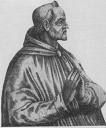
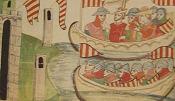



1276 On Jan. 10 Pope (since 1271) Gregory X (b. 1210) dies, and on Jan. 21 Pierre of Tarentaise is elected Pope (#184) Innocent V (1225-76) (first Dominican pope); he dies on June 22, and on July 11 Ottobono Fieschi is elected Pope (#185) Adrian (Hadrian) V (-1276); he dies within 5 weeks on Aug. 18, and on Sept. 8 Pedro Julinao is elected Pope (#186) John XXI (1210-77), and crowned on Sept. 20, becoming the first Portuguese pope (until ?), and the first physician pope (until ?), having given medical advice to Gregory X (1271-6), Innocent V (1276), and Adrian V (1276), none of whom lived long and prospered from his prescriptions of lettuce leaves for toothache, lettuce seed to reduce sex drive, and pig dung to stop nosebleeds; there is no Pope John XX because of cardinal deacon John son of Robert, who opposed Boniface VII after the death of John XIV. On July 27 after falling ill in Alzira and resigning with the intention of retiring to the Monastery of Poblet, king (since Sept. 12, 1213) James I the Conqueror of Aragon (b. 1208) dies in Alzira, Valencia, and his eldest son Peter III (1239-85) becomes king of Aragon and Valencia and count of Barcelona (until Nov. 11, 1285), while his 2nd son James II the Just (1267-1327) signs the Treaty of Perpignan (capital of Roussillon), becoming king of Majorca, Ibiza, and Formentera, count of Roussillon and Cerdanya, and lord of Montpellier as a vassal of Aragon (until 1311), which doesn't set well with him since he has the larger domain, causing him to get in a constant battle with his big brother and end up allying with the king of France against him; meanwhile the Muslims, seeing their chance begin a revolt in Valencia (ends 1280); the Kingdom of Labia, er, Majorca is founded (until 1349). On Oct. 7 after travelling to Rome, Charles I of Anjou takes an oath of fealty for Sicily, promising that it will never unite with Tuscany, Lombardy or the Roman Empire. After the Hungarians and some of the Bohemian nobility back HRE Rudolf I, Ottokar II surrenders, and Rudolf outlaws him, takes all his dominions except Bohemia and Moravia, and forces him to recognize his suzerainty over them; Rudolf I begins attempting to assert Hapsburg feudal rights in Switzerland, causing them to band together to resist him. After his father threatens to pass him over for a younger brother Stefan Milutin, Stefan Dragutin (-1316) rebels with Hungarian help, and becomes king of Serbia (until 1282), while daddy abdicates and retires to the Monastery of Sopocani, dying next May 1. After crossing the Yangtze River, the Mongols capture the Nan Song city of Lin An (modern-day Hangzhou), and empress dowager Xie surrenders on the condition that her son Song Gongdi be allowed to live after being demoted to a duke, after which he is ordered in 1289 by Kublai Khan to go to Tibet to become a monk, becoming a great scholar; too bad, he writes a poem expressing his longing to become emperor, causing him to be executed in 1323; meanwhile his older brother Song Duanzong (1268-78) (along with his infant brother Bing) escapes to Fujian on Lantau Island (modern-day Kowloon City) in S China, setting up the govt. in Fuzhou, becoming Southern (Nan) Song emperor #8 of China on June 14 (until May 8, 1278). The Mamluks invade Nubia, and spend the next cent. trying to incorporate it as a Malmuk province with puppet rulers, only to see their control wither by the end of the 14th cent. The Hapsburgs gain possession of scenic Styria (Steiermark) in SC Austria, and make it into a duchy. Aurich in Lower Saxony is first mentioned, whose rulers are always getting into power struggles with chieftains of East Frisia. The town of Gliwice ("gliw" = loam or wetland) in Upper Silesia in WC Poland (modern-day pop. 179K/2.7M) is first mentioned; in the mid-18th cent. it is taken along with most of Silesia by Prussia, and incorporated into the German Empre in 1871; in 1796 the first coke-fired blast furnace in Europe is build there. Births: English Luttrell Psalter knight Sir Geoffrey Luttrell II (d. 1345); great-great-grandson of Sir Geoffrey de Luteret. Deaths: Spanish king of Aragon (1213-76) James I the Conqueror (b. 1208) on July 27 in Valencia; leaves Libre dels Fets (an autobio. blowing his own conquering horn) and Libre de la Saviesa (Book of Wisdom).


1277 On May 20 Pope (since 1276) John XXI dies six days after a private apt. he uses for studies collapses on him, causing relief in some parts of the Vatican where he is thought to be the Antichrist, and on Nov. 25 Giovanni Gaetano (an Orsini) is elected Pope (#187) Nicholas III (1216-80). Della Torre dies, and rival Archbishop Otto Visconti becomes ruler of Milan, founding the 170-year Visconti Dynasty of Milan (ends 1447). On July 1 sultan (since Oct. 24, 1260 Baibars (b. 1223) dies, and his son Al-Said Barrakah (Muhammed Barakah Qan) (1260-80) becomes Mamluk sultan #2 (until 1279). After Welsh Prince Llywelyn the Last fails to renew his homage and in 1275 marries his enemy Simon de Montfort's daughter Eleanor de Montfort (1252-82) by proxy (causing him to hire pirates to capture her ship), Edward I Longshanks takes a large army to Wales, starves the prince into submission in Snowdon, and forces him to sign the Treaty of Aberconwy, which reduces his principality to North Wales, and makes him pay homage again; the parts of Wales seized by Edward are introduced to English law, organized into shires; at least Edward allows Llywelyn to have his babe back, and they are officially married in Worcester Cathedral, becoming known as Lord and Lady Snowdon. Ljubljana (Lyublyana) (Laibach) in Slovenia comes under Hapsburg rule. The Kilwa Sultanate off modern-day Tanzani passes into the hands of the Arab Abu Maheb family (until 1505). After Dominican head John of Vercelli and Franciscan head Jerome of Ascoli agree to order their friars to refrain from criticizing each other, Friar Roger Bacon is imprisoned for teaching "suspected novelties" (heresy?) (until 1292). St. Margaret of Cortona (1247-97) begins hearing a voice calling her "poverella". Ramkhamhaeng the Great (1239-1317) becomes king #3 of the Phra Ruang Dynasty of Succotash, er, Sukhothai (until 1317), which extends from Vientiane W to Pegu, going on to create the Thai alphabet and establish Theravada Buddhism as the state religion. The bishop of Paris prohibits the teaching or reading of Aristotle at the U. of Paris, which proves hard to enforce; meanwhile Oxford U. continues to study his works. Architecture: The 1/2-mi.-long Passetto di Borgo elevated covered passageway is built between the Vatican and the fortified Castel Sant'Angelo on the banks of the Tiber River in Rome to serve as a papal escape route; it comes in handy to save the life of Pope Clement VII during the sack of Rome in 1527 by HRE Charles V. Erwin von Steinbach (1244-1318) begins major French Gothic improvements to Notre Dame de Strasbourg Cathedral in France (until 1318); in 1647-1874 it is the world's tallest bldg. Poetry: Konrad von Wurzburg (1225-87), Partonopier und Meliur (verse romance). Births: Byzantine emperor (1294-1320) Michael IX Palaeologus (Palaiologos) (d. 1320) on Mar. 27; eldest son of Andronicus II Palaeologus (1259-1332) and Anna of Hungary. English uncrowned king Thomas, 2nd Earl of of Lancaster (d. 1322) (b. 1278?); eldest son of Edmund Crouchback, 1st earl of Lancaster (1245-96) (brother of Edward I) and Blanche of Artois; nephew of Edward II. French king of Naples and Jerusalem (1309-43) ("the peacemaker of Italy") Robert (the Wise) of Anjou (d. 1343); eldest son of Charles II the Lame (1254-1309) and Maria Arpad of Hungary (1257-1323) (daughter of Stephen V of Hungary); brother of St. Louis of Toulouse (1274-97). Deaths: Italian surgeon William of Salicet (b. 1210). Egyptian Mamluk sultan #1 Baibars (b. 1223) on July 1 in Damascus.




1278 In Jan. after purchasing it, Sicilian king (1266-85) Charles I of Naples (Anjou) (1227-85) is crowned king of Jerusalem, and acknowledged by the barons in Acre. Mamluk sultan Al-Said Barakah sends 20K troops under emirs Qalawun and Baysari to raid Cicilian Armenia and Rum, with a secret plan to arrest the emirs on their return, but Emir Kuvenduk tips them off, and they instead force Barakah to abdicate; his 7-y.-o. brother Solamish (Sulamish) (1272-91) becomes Mamluk sultan #3 (until ?), with Qalawun as regent and de facto sultan. As Mongol forces are about to break through, Chinese emperor Song Duangzong and his minister Lu Xiufu (-1279) flee to Guangdong province, staying in Hong Kong (Chin. "fragrant harbor"); later the Song Wong Toi (Chin. "Terrace of the Song Kings") is erected in Kowloon City in commemoration; too bad, in Mar. Song Duangzong (b. 1268) falls off a boat while fleeting the Mongols and nearly drowns, dying on May 10, and his younger brother Song Zhao Bing (1271-9) becomes emperor #9 (last) of the Nan (Southern) Song Dynasty in China (until 1279). On May 1 prince (since 1246) William II of Villehardouin (b. ?) dies, and Charles I of Naples succeeds him as king of Achaea, ending the Villehardouin Dynasty and beginning the Anjevin Dynasty, making it a province of Naples and turning the duchy of Athens into the most powerful independent state in Greece; William leaves the Manuscrit du Roi, showing what a noble poet he was? On Aug. 5 Alfonso X of Castile begins the Siege of Algeciras, which is under Moroccan control; he abandons it next Aug. On Aug. 26 after listening to his overambitious wife Kunigunda (the Bohemian Lady Macbeth?) and taking up arms against HRE Rudolf I of Hapsburg, who allies with Ladislav IV of Hungary, Ottokar II (b. 1230) is defeated and KIA at the Battle of Durnkrut (Dürnkrut) (Marchfeld) on the Marchfeld (Moravsko Pole) in NE (Lower) Austria, involving 80K men (largest knight battle in the Middle Ages); the Hapsburgs under HRE Rudolf I gain control of Austria (until 1918), and choose Vienna as their capital; Ottokar II is succeeded by his 7-y.-o. son Wenceslaus II (1271-1305) as Premyslid king of Bohemia under the regency of margrave Otto IV of Brandenburg (1238-1308), appointed by HRE Rudolf I; after Otto IV tries to stay in charge by imprisoning the boy, his mother's secret husband Zavis of Falkenstein (1245-90) rules for him until he has him executed in 1290 and assumes personal rule. In Aug. the Statute of Gloucester is passed in England, becoming the first recorded in a Statute Roll, encouraging loyal subjects to petition King Edward I against his own barons and ministers, modifying novel disseisin (Lat. "recent dispossession") (action for recovery of land seized illegally), reviving the system of gen. eyres (royal justices riding circuit), and increasing the number of pleas of quo warranto (Lat. "by what warrant?") that they can hear; too bad, the statute limits actions on writs of trespass in the royal courts to property damage above 40 shillings, maims, beatings, and wounds, causing the writs to begin alleging "vi et armis" (force and arms). On Sept. 29 Peter III of Aragon captures the Muslim stronghold of Montesa in Valencia, and expels the Muslims from his realm. Alexander III of Scotland does homage to the English king for his English lands, "reserving" his Scottish fealty - was he thrown out of school? Margaret II abdicates as countess of Flanders in favor of her son Count Guy of Dampierre (1226-1305). The original Genovia of the Princess Diaries? The tiny principality of Andorra on the Spanish-French border is established by a treaty between the Spanish bishop of Urgell and the French count of Foix (whose descendants inherit France in 1589 and issue an edict in 1607); it becomes the last remaining feudal dual principality in Europe in modern times, shared by the bishop of Urgell and the pres. of France, with Catalan as the official language; starting in ? Sept. 8 becomes the annual celebration of Our Lady of Meritxell. Guillaume, the last Latin prince of Achaea dies. Pope Nicholas III, at the request of Abaga, Khan of the Tartars sends five Franciscan missionaries to preach in Persia and China. In London 278 Jews caught clipping coins are hanged, while Christians found guilty of the same offense are merely fined. From this year to 1340 the account books of Genoa are lost; when they resume, they're using double-entry bookkeeping. Architecture: The Pisa Cathedral Baptistery (begun 1153) is finished. Inventions: The glass mirror is invented in Venice; no metallized backing until the 16th cent. Deaths: Indian religious leader Madhva (b. 1199). Austrian knight and chivalry poet Ulrich von Lichtenstein (b. 1200); buried in Seckau. Italian sculptor Nicola Pisano (b. 1220) in Pisa; buried in the Campo Santo in Pisa, the most beautiful cemetery in Italy, designed by his son Giovanni Pisano. Bohemian king (1253-78) Ottokar II (b. 1230) on Aug. 26 (KIA in the Battle of Durnkrut). German chronicler-historian Martin of Troppau. Achaean Latin prince (last) William II de Villehardouin (b. ?) on May 1.



1279 On Feb. 6 king (since Jan. 4, 1248) Afonso III (b. 1210) dies, and his son Denis (Dinis) I (the Farmer King) (the Poet King) (1261-1325) becomes king #6 of Portugal (until Jan. 7, 1325), going on to order the planting of a large pine forest near Leiria for conservation and for shipbuilding, and become known for his poetry. On Mar. 19 the Yuan Dynasty of Kublai Khan finishes off the Southern (Nan) Song Dynasty in China (founded 1127) at the Battle of Yamen, where emperor Song Zhao Bin is either KIA or escapes with the fleet of adm. Zhang Shijie across the sea, and founds the Luzon (Lu Song) (Lesser Song) Empire; Lu Xiufu jumps off the cliffs of Mt. Yashan; Kublai Khan sends an emissary to the Vietnamese emperor in Thang-Long (Hanoi) demanding surrender, and when he refuses he begins a war (ends 1288). On Dec. 7 (Old Style) Boleslaus V the Chaste (b. 1221) dies leaving no heirs, and Leszek the Black (1241-88) becomes ruler of Cracow (until 1288). Edward I of England cedes Normandy to Philip III of France. After getting pissed-off at clerics for refusing to approve taxes in their provincial assemblies, Edward I passes the first of two Statutes of Mortmain (2nd in 1290), forbidding the granting of lands to ecclesiastical bodies without royal consent, becoming the first step taken by the English to free themselves from papal taxation and submission to "foreign" ecclesiastical officials, reducing the power of the Church to withdraw land from taxation and control by the civil govt. Former Turkish slave Al-Mansur Sayf-al-Din Qalaun (Qalawun as-Salihi) (1222-90) deposes the son of al-Baybars, and becomes Bahriyya sultan #7 of the Mamluk Empire (until Nov. 10, 1290), building a great hospital in Cairo with an endowment of 1M dirhems. Hungary enacts the decree of the 1215 Fourth Lateran Council requiring Jews and Muslims to wear special markings on their clothing. Florentine artist Giovanni Cimabue encounters 12-y.-o. shepherd Giotto di Bondone sketching a sheep on a rock in a meadow, and takes him as his apprentice - the original Playboy? In 1279 Pope Nicholas III approved the proposition of the Spirituals (Fraticelli) (Little Brethren) (Zealots) of the Order of St. Francis that Christ and his apostles had owned no property, justifying their living in small hermitages; in 1323 Pope John XXII reversed this infallible decision and handed them over to the Inquisition. Architecture: Kublai Khan builds an observatory on the city wall of Khanbalig (Beijing), with bronze astronomical instruments cast by Guo Shoujing (1231-1316). Nonfiction: Abraham Abulafia (1240-92), The Book of the Righteous (Sefer ha-Yashar); prophetic book written in Patras, Greece. Births: English queen (1299-1307) ("the Pearl of France") Marguerite of France (d. 1318) in Paris; daughter of Philip III (1245-85) and Maria of Brabant (1254-1321); 2nd wife (1299-) of Edward I (1239-1307); mother of Thomas of Brotherton, 1st Earl of Norfolk (1300-38), Edmund of Woodstock, 1st Earl of Kent (1301-30), and Eleanor of England (1306-11). Deaths: Portuguese king (1248-79) Afonso III (b. 1210) on Feb. 16 in alcobaca. Polish king (1227-79) Boleslaus V the Chaste (b. 1226) on Dec. 7 (Old Style).